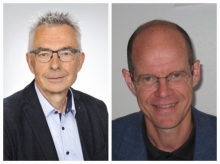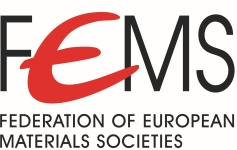Q&A With FEMS EUROMAT 2023 CHAIR & CO-CHAIR
After one of the most successful FEMS EUROMAT conferences, we caught up with Prof Ehrenfried Zschech (Chair, left) and Prof Eric Le Bourhis (co-Chair, right)

What is your general impression on the conference?
EZ: FEMS EUROMAT 2023, the largest materials congress in Europe, provided a platform for discussions and networking – crucible for both research and innovation in the field of materials science and engineering. For 4 days in September, Frankfurt was the very lively 'European Capital of Materials Science', the meeting point for nearly 2.000 experienced researchers, young scientists and students.
ELB: It is excellent, the conference run very well on many aspects, science of course, exchange and networking. Materials science is the requested brick to address our challenges of climate change and sustainability as highlighted during the plenaries.
Why do you think the conference was such a success?
EZ: The conference addressed the problems that we have to solve such as to stop the anthropogenic climate change and the participants demonstrated the decisive role that materials play for future-oriented technologies. In more than 1.000 talks and nearly 400 poster contributions, new materials with tailored properties and particularly materials for sustainable technologies were presented.
ELB: The first key that comes into mind is its excellent preparation by the organizing society DGM, then the programme that structured by the scientific committee highlighting the latest developments and challenges on a large spectrum of topics, and last but not least, the post-COVID importance of on-site meetings to develop new ideas and collaborations.
What were your personal highlights?
EZ: I would mention two of many highlights at FEMS EUROMAT 2023. I was impressed by the outstanding plenary talk given by Matthias Maurer, ESA astronaut and materials scientist, on materials science topics onboard the International Space Station. I was very excited by the high quality of the poster presentations provided by young scientists and students. Considering these two out of many highlights, I have no doubt about the future of materials science in Europe.
ELB: We observe quickly developing experimental techniques that can be operated in parallel so as to assess the properties of materials at relevant scales and tailor the structures for specific design. This offers hints for applications and devices circular-by-design to face global changes.
What would you have done differently if you could?
EZ: I would involve the faculties and students from the local universities more. With the University of Granada, one of the five best universities in Spain and the most popular destination for ERASMUS students, there is a huge potential for collaboration in preparation of FEMS EUROMAT 2025 and joined activities during the upcoming conference.
ELB: I would have promoted the tutorials and their tradition further since they are unique opportunities for exploring a field guided by a specialist.
Any words of advice for the FEMS EUROMAT 2025 organisers?
EZ: Attract more participants from industry – both large companies and start-ups. As a Past President of FEMS and FEMS Honorary Member, I am committed to support the organizers of the upcoming conference in this task. I am looking forward to FEMS EUROMAT 2025 in Granada!
ELB: Yes, enjoy the preparation of the next FEMS EUROMAT with your team as this is a unique opportunity for new friendships and challenges. Looking forward to 2025!
Thank you

